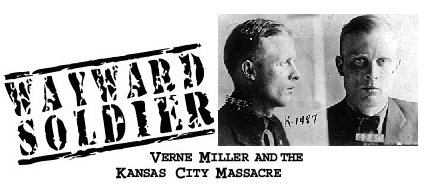Index Interviews Audio File History Time Line Photo Gallery SDPB

JEFF LANZA
Special Agent, Kansas City FBI
Interview by Brian Bull
Is it true that you have the same badge number as a Kansas City Massacre survivor?
Yes, the actual badge that the person carried with him later in his career. His name is Frank Smith, and he was at the Union Station Massacre. He was the only agent that was not killed or injured in the attack. And when he retired from the FBI, his badge was passed along to another agent..I'm not sure how many in between, but I ended up with the badge. It's not the badge he carried that day because we were not known as the Federal Bureau of Investigation that day, but he did get that badge later in career.
How does it make you feel to have that connection?
I'm honored really to have such a connection to a major event in the history of the FBI, and the fact I was assigned to Kansas City which is the same place as the Union Station Massacre. It's quite a coincidence and I'm honored to have such a badge.
Why is the Union Station Massacre important in the history of the FBI?
Well, people have to understand that in late 1920s and early 1930s, there were terrorists running around this country. They weren't from the Middle East, they weren't people like Timothy McVeigh. They were people like Pretty Boy Floyd, John Dillinger and Bonnie and Clyde. And what they did was terrorize the country by robbing banks, stealing cars, committing murders, then crossing county and state lines to avoid being captured, and the FBI at the time was powerless to stop them. We couldn't make arrests, or carry firearms. We were known as a small agency known as the Bureau of Investigation, it was really an agency involved in some kinds of criminal investigation but very limited.
After the Union station massacre took place, the shock waves from those gunshots that day, literally sent..were heard around country. And FDR, who was president, and J. Edgar Hoover, who was the head of the FBI, took advantage of this opportunity and public outrage about this event to get more power for the FBI. We were renamed the Federal Bureau of Investigation, we were given the power to make arrests, the power to carry firearms, our national academy in Quantico was created, we started better training, we hired more agents, we got additional jurisdiction. Most of all, we had power to chase criminals across state lines, which is the way they got away to avoid being prosecuted prior to the Union Station Massacre.
So despite the deaths of four lawmen and a federal prisoner, the Union Station Massacre had a long-term positive effect?
Those officers that day - those police and FBI agents -- certainly did not die in vain. Their deaths had significant meaning, on law enforcement in this country. Not just because the FBI changed, but people's feelings about these criminals at the time changed. In come cases they were looked at as folk heroes. They robbed banks, stole cars, people didn't realize how violent they were. And that changed everything. The perception of these individuals..on June 16th..
The perception of individuals changed on that June day, in 19-33. Because people realized they were murderers, and they took the lives of law enforcement officers which was an outrageous thing to do. That changed people's perceptions, and it gave us the mandate to chase these crooks down and put them in jail.
I hear the original bullet holes are still in the Union Station's facing...
As a matter of fact, I was just over there other day, because we had a memorial service for slain agents throughout the years. Not just for those who died that day. And I look for those bullet holes, and as I had before many years ago, I found them and they're there, on the east side of the Union station. There's a couple of gouges in the marble there, which are widely reported to be bullet holes from that event. I believe they are, and I found them that day, and it brings back.it certainly makes you think about that event.
So do you see any parallels between today's" War on Terrorism" and the war on crime back in the 1920s and 30s?
Well, I think definitely what happened back in 1933 in Union Station changed the FBI, it changed our priorities, changed our mandate to chase criminals, and in past years we've had some events, one in particular changed the FBI.how it's is working, it changed our priorities, so we're tracking down terrorists more than before -- so there are parallels to what happened back in 1933.
Index Interviews Audio File History Time Line Photo Gallery SDPB